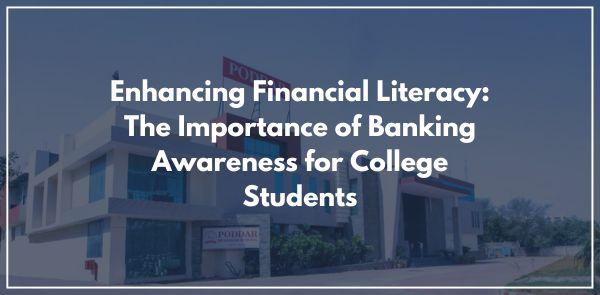
Dear Students,
As you embark on your journey towards higher education, it's essential to equip yourselves with not only academic knowledge but also practical life skills that will serve you well beyond the classroom. One such skill that holds immense significance in today's world is banking awareness.
In a rapidly evolving financial landscape, understanding the fundamentals of banking is crucial for making informed decisions about your finances, whether it's managing your student loans, setting up a savings account, or planning for your future financial goals.
In our latest article, "Enhancing Financial Literacy: The Importance of Banking Awareness," we delve into why banking awareness matters and how it can empower you to navigate the complexities of the modern financial world with confidence and competence.
By developing a strong foundation in banking awareness, you'll be better equipped to manage your finances responsibly, protect yourself from financial pitfalls, and pave the way for a financially secure future.
At Poddar Business School, we are committed to not only providing you with academic excellence but also nurturing your holistic development. We encourage you to take advantage of resources and opportunities available to enhance your financial literacy, including workshops, seminars, and online resources.
Remember, your education extends beyond the confines of the classroom, and by investing in your financial knowledge today, you're investing in a brighter tomorrow.
Wishing you success in your academic pursuits and beyond,
Poddar Business School
Here is the article to enhance your Financial Literacy
Enhancing Financial Literacy: The Importance of Banking Awareness
In today's fast-paced and interconnected world, financial literacy is not just a desirable trait; it's an essential skill. Among the various aspects of financial literacy, banking awareness holds a pivotal position. Understanding how banks operate, the services they offer, and their role in the economy can empower individuals to make informed decisions about their finances, contribute to economic stability, and build a financially secure future.
What is Banking Awareness?
Banking awareness encompasses a broad understanding of the banking sector, including its functions, products, regulations, and the significance it holds within the larger economic framework. It involves being cognizant of various banking concepts such as deposits, loans, interest rates, credit cards, electronic fund transfers, and more.
Why is Banking Awareness Important?
1. Personal Finance Management: A sound understanding of banking principles enables individuals to manage their finances effectively. This includes making wise choices about savings accounts, investments, loans, and credit options.
2. Financial Decision Making: Whether it's choosing the right type of account, comparing loan options, or understanding the implications of different banking fees, being aware of banking fundamentals empowers individuals to make informed financial decisions that align with their goals.
3. Consumer Protection: Banking awareness helps consumers protect themselves from fraud, scams, and predatory financial practices. By understanding their rights and responsibilities as banking customers, individuals can identify suspicious activities and safeguard their financial assets.
4. Economic Participation: Banks play a crucial role in economic development by facilitating savings, investments, and lending activities. A population that is well-versed in banking concepts can actively participate in the financial system, thereby contributing to economic growth and stability.
5. Career Opportunities: Banking awareness is not only beneficial for personal finance but also for career prospects. Understanding banking operations and financial principles opens doors to a wide range of job opportunities in the banking and finance sector.
How to Improve Banking Awareness?
1. Education and Training: Formal education programs, workshops, and seminars on financial literacy can impart essential banking knowledge to individuals at various stages of life, from school-age children to adults.
2. Self-Study and Research: With abundant resources available online and offline, individuals can take the initiative to educate themselves about banking concepts. This includes reading books, articles, and reputable financial websites, as well as attending webinars and online courses.
3. Utilize Banking Services: Actively engaging with banking services provides practical exposure to banking operations. Individuals can open accounts, apply for loans, and explore various banking products to gain hands-on experience and understanding.
4. Seek Guidance: Consulting with financial advisors or banking professionals can offer personalized insights and guidance tailored to individual financial goals and circumstances.
5. Stay Informed: Keeping abreast of developments in the banking sector, including regulatory changes, technological advancements, and market trends, ensures that individuals maintain a current understanding of banking practices and their implications.
Conclusion
Banking awareness is an indispensable component of financial literacy that empowers individuals to navigate the complexities of the modern financial landscape with confidence and competence. By fostering a culture of banking awareness through education, training, and active engagement, we can equip individuals with the knowledge and skills necessary to make sound financial decisions, protect themselves from financial risks, and contribute to a healthier and more prosperous economy. As we strive for greater financial inclusion and empowerment, let us recognize the pivotal role that banking awareness plays in shaping a brighter financial future for all.
